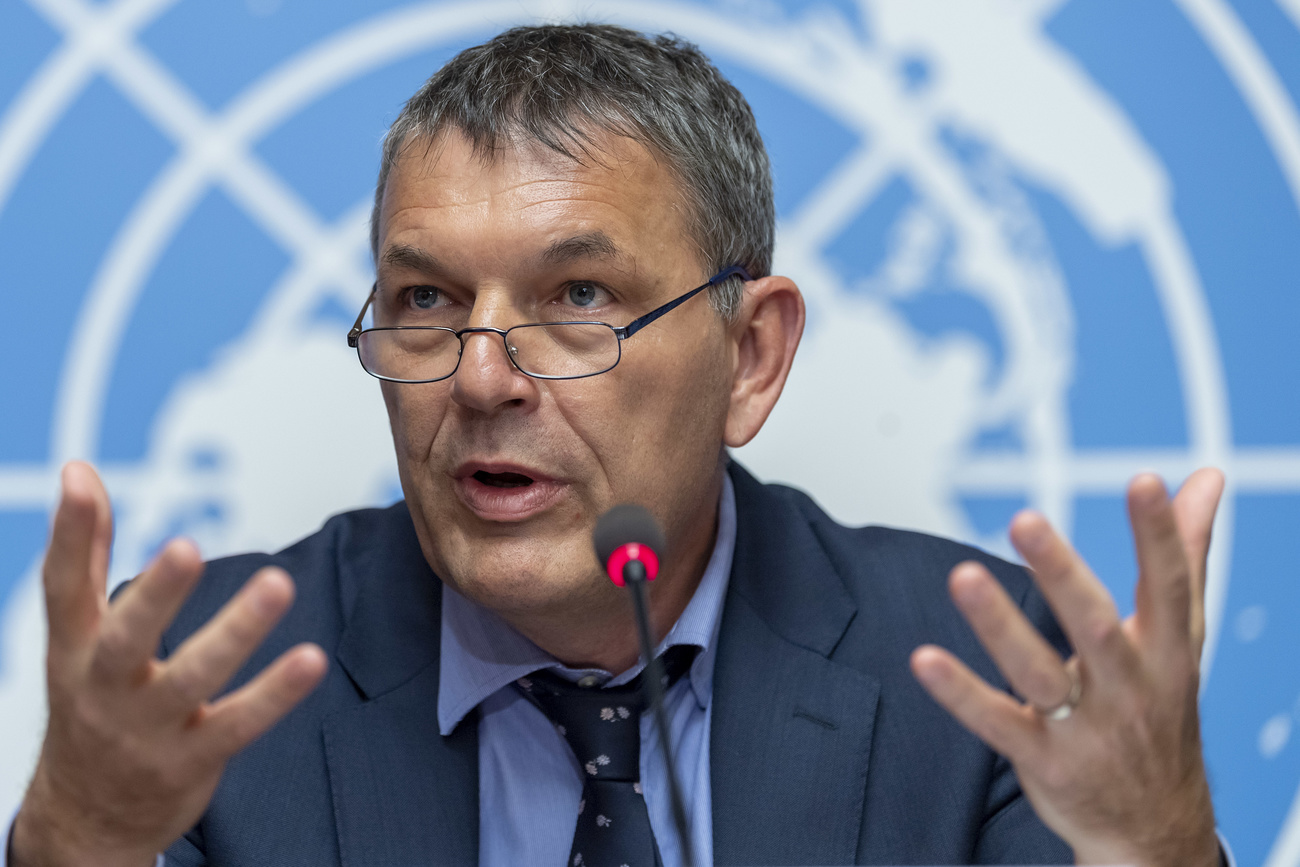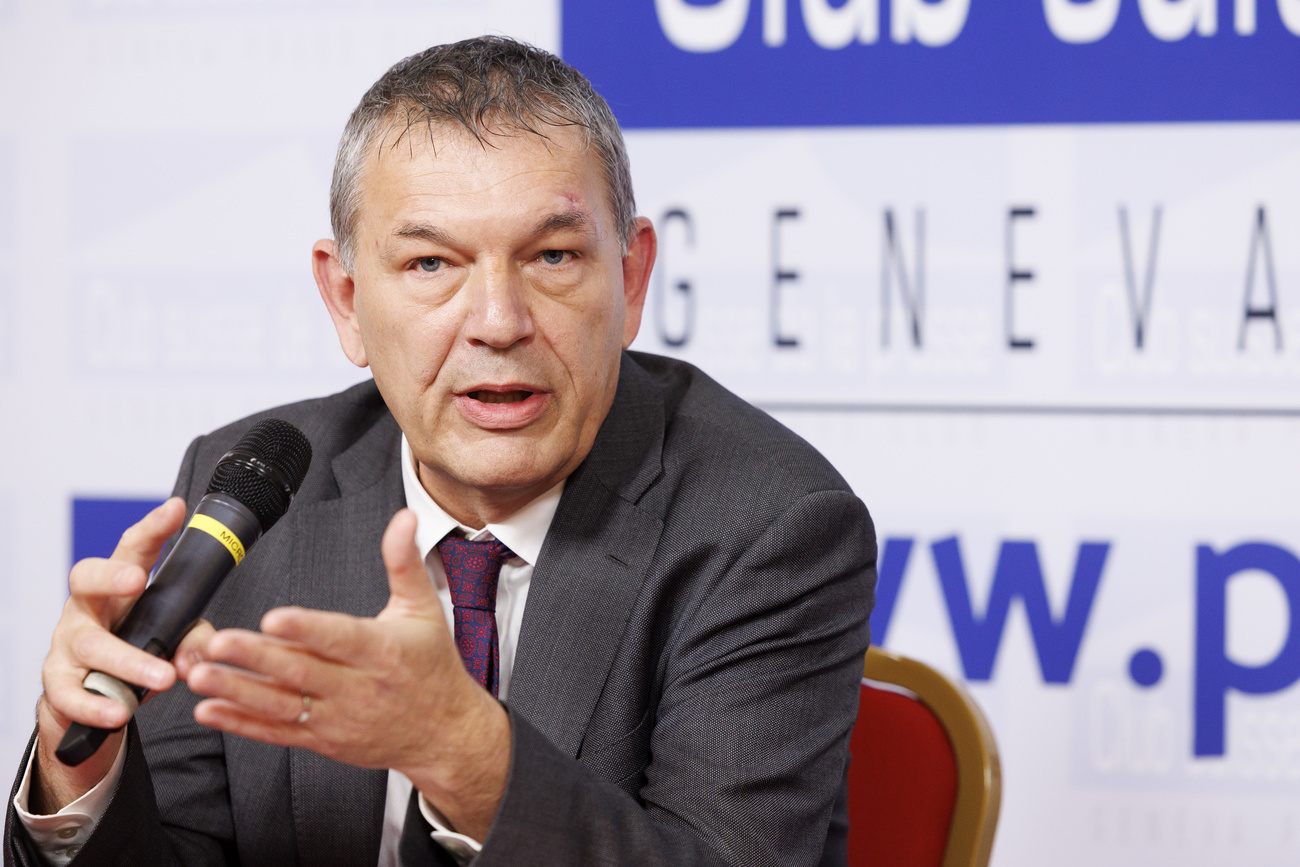Philippe Lazzarini: ‘now more than ever, we need a humanitarian ceasefire’

The situation in the north of the Gaza Strip is “hell on earth”, according to Philippe Lazzarini, the Swiss man who heads the United Nations Relief and Works Agency for Palestine Refugees (UNRWA).
As well as the ongoing Israeli bombing, access to food and water supplies have been cut off by the strict blockade, Lazzarini told Swiss public broadcaster RTS on Monday.
On Sunday, Israel announced that its troops had surrounded Gaza City in the north of the coastal strip. On Monday night, the army again stepped-up its bombing campaign, killing more than 200 people, according to Hamas’ health ministry. Shortly before, telephone and internet connections had been cut by Israel for the third time since October 7. The Israeli military then said on Wednesday that it was fighting in the heart of Gaza City and that the air and ground offensive was targeting the militants’ tunnel network beneath the besieged Palestinian enclave.

More
‘We can no longer maintain the status quo,’ says UNRWA head Philippe Lazzarini
The situation is “extremely worrying”, UNRWA head Lazzarini told the RTS “Forum” programme.
“There are still between 250,000 and 350,000 people in Gaza City, many of whom are in UNRWA schools,” he said, and recalled that these schools “have not been spared by [Israel’s] military operations”. Last week, four UN-run schools which were acting as shelters for displaced people were hit by bombs, which UNRWA says killed 23 and injured dozens.
‘Gaza is not a single entity’
The situation in hospitals is also “alarming”, Lazzarini said. While Israel did on Monday announce the opening of an evacuation corridor to the south, many Gazans are not in a position to flee, he said. “There are many children, old people, and people with reduced mobility” – not to mention the injured who cannot travel.
Inhabitants in the north of Gaza are facing “hell on earth”, Lazzarini said. Bombings continue unabated, and there are shortages of everything: water, electricity, food. “Even UNRWA facilities – which should be able to offer protection – are being targeted. More than 50 of our establishments have been hit, with dozens of deaths and injuries,” he said.
Israel has justified these strikes by claiming that Hamas tunnels are hidden below certain UN buildings. But Lazzarini says that, in the past, each time an underground chamber had been discovered, UNRWA “had protested to Hamas and informed Israeli authorities”. The latter are also warned when UN schools are being used to shelter the civilian population.
“Now more than ever, we need a humanitarian ceasefire,” he says. “It’s also important to remember the human lives and histories in Gaza, like everywhere in the world; Gaza is not a single entity where everybody is a representative of Hamas.”

More
‘Without fuel, we will fail the people of Gaza’
Food, water, fuel
The UNRWA commissioner-general also spoke about the looting of various storehouses belonging to his organisation – incidents he said were due to the desperation of the Gazan population. “The strict blockade has led to shortages of food and water. We had one or two cases of looting of our facilities, by people in total despair, who have to struggle daily to secure a slice of bread […] The market can’t provide anymore. Everyone is dependent on UNRWA, and the few trucks that were allowed to enter can’t offset the impact of the blockade, which is soon going to cause a large loss of life in Gaza.”
The humanitarian aid entering the enclave is “a drop of water” compared to the huge needs of the population, said Lazzarini, who was in Gaza last Thursday. “I visited a school and displaced people,” he said. “To see the population reduced to begging for a drop of water and a piece of bread, while not knowing whether the UN school where they are sheltering can protect them from future bombings – that was definitely the saddest day of my humanitarian career.”
Lazzarini also warned about the lack of fuel, on which “everything depends” in Gaza – notably hospitals and water stations. Supplies will run out in the coming days, he said, before denying the claims of some Israeli media who have accused Hamas of siphoning off fuel meant for UNRWA.
Translated from French by Domhnall O’Sullivan

In compliance with the JTI standards
More: SWI swissinfo.ch certified by the Journalism Trust Initiative








You can find an overview of ongoing debates with our journalists here . Please join us!
If you want to start a conversation about a topic raised in this article or want to report factual errors, email us at english@swissinfo.ch.